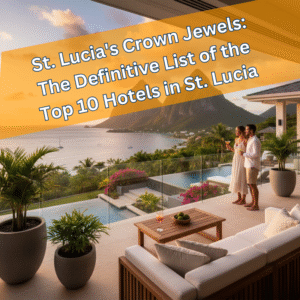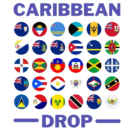ST LUCIA

Motto
“The Land, The People, The Light”
Capital
Size
Highest Point
National Dish
Population
Language
Overview
St Lucia, a breathtaking island in the eastern Caribbean, is known for its dramatic landscapes. Its closest neighbours are the islands of Martinique, to the north, and Saint Vincent, to the south-west. The island was originally inhabited by the Arawak and later the Carib peoples before being discovered by Europeans in the early 16th century.
St Lucia’s history is marked by a series of struggles between the French and the British, both of whom valued the island for its strategic location and fertile lands. The island changed hands 14 times between these two colonial powers, earning it the nickname “Helen of the West Indies,” similar to Helen of Troy, who was fought over by the Greeks and Trojans. Eventually, in 1814, the British took full control of St. Lucia. The island remained under British rule until it gained independence in 1979, becoming a member of the Commonwealth.
Today, St Lucia is celebrated for its stunning natural beauty and diverse attractions. The island’s most iconic landmarks are the Pitons, two towering volcanic peaks that rise dramatically from the sea and are a UNESCO World Heritage site. Hiking Gros Piton, the larger of the two peaks, is a popular activity for adventurous visitors, offering breathtaking views of the island and the surrounding ocean.
In addition to the Pitons, St Lucia boasts beautiful beaches like Anse Chastanet and Reduit Beach, perfect for relaxing, swimming, and snorkeling in the crystal-clear waters. The island is also home to the only drive-in volcano in the Caribbean, Sulphur Springs, where visitors can explore the bubbling hot springs and mud baths.
The charming town of Soufrière, nestled near the Pitons, is rich in history and culture, with attractions like the Diamond Falls Botanical Gardens, where you can see a stunning waterfall and relax in natural mineral baths.
For those interested in the island’s colonial past, the capital city of Castries offers historical sites like the Cathedral of the Immaculate Conception and Fort Charlotte, which provide insights into St. Lucia’s turbulent history.
St. Lucia’s vibrant culture is also a major draw, with a mix of African, French, and English influences reflected in its music, dance, and cuisine. The island’s annual Saint Lucia Jazz Festival is a highlight, attracting international artists and music lovers from around the world.
Whether you’re exploring its lush rainforests, enjoying its pristine beaches, or immersing yourself in its rich culture, St. Lucia offers a perfect blend of adventure, relaxation, and history, making it one of the most enchanting destinations in the Caribbean.
Latest
- 10 Yoga Retreats in the Caribbean That Will Make You Forget Your Password

- Top 10 Caribbean Fitness Holiday Destinations: Where Paradise Meets Your Personal Best

- Top 10 Islands for Diving Holidays in the Caribbean: Your Ultimate Underwater Paradise Guide

- St Lucia’s Crown Jewels: The Definitive List of the Top 10 Hotels in St Lucia

